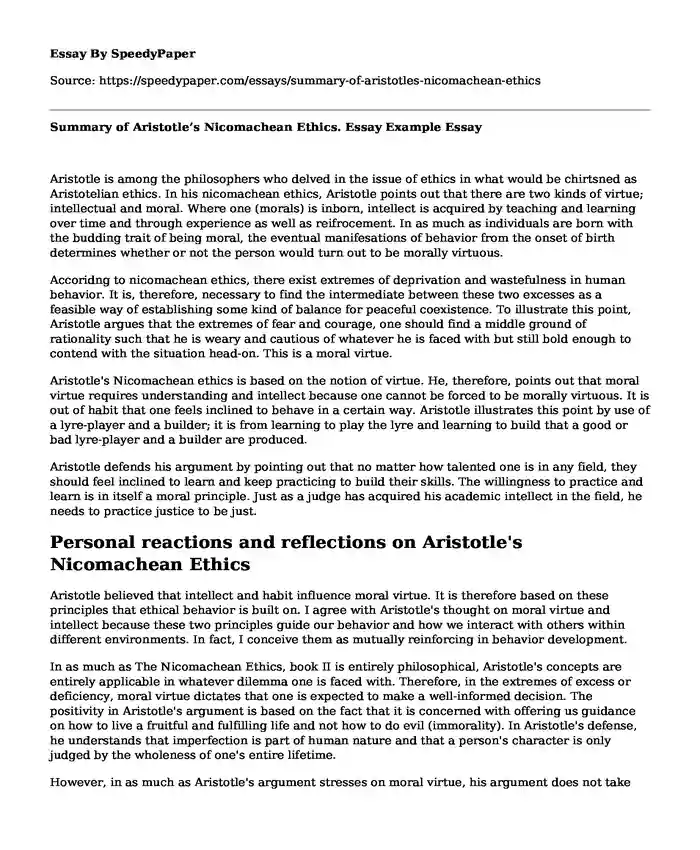
| Type of paper: | Essay |
| Categories: | Intelligence Philosophers Ethical dilemma |
| Pages: | 3 |
| Wordcount: | 558 words |
Aristotle is among the philosophers who delved in the issue of ethics in what would be chirtsned as Aristotelian ethics. In his nicomachean ethics, Aristotle points out that there are two kinds of virtue; intellectual and moral. Where one (morals) is inborn, intellect is acquired by teaching and learning over time and through experience as well as reifrocement. In as much as individuals are born with the budding trait of being moral, the eventual manifesations of behavior from the onset of birth determines whether or not the person would turn out to be morally virtuous.
Accoridng to nicomachean ethics, there exist extremes of deprivation and wastefulness in human behavior. It is, therefore, necessary to find the intermediate between these two excesses as a feasible way of establishing some kind of balance for peaceful coexistence. To illustrate this point, Aristotle argues that the extremes of fear and courage, one should find a middle ground of rationality such that he is weary and cautious of whatever he is faced with but still bold enough to contend with the situation head-on. This is a moral virtue.
Aristotle's Nicomachean ethics is based on the notion of virtue. He, therefore, points out that moral virtue requires understanding and intellect because one cannot be forced to be morally virtuous. It is out of habit that one feels inclined to behave in a certain way. Aristotle illustrates this point by use of a lyre-player and a builder; it is from learning to play the lyre and learning to build that a good or bad lyre-player and a builder are produced.
Aristotle defends his argument by pointing out that no matter how talented one is in any field, they should feel inclined to learn and keep practicing to build their skills. The willingness to practice and learn is in itself a moral principle. Just as a judge has acquired his academic intellect in the field, he needs to practice justice to be just.
Personal reactions and reflections on Aristotle's Nicomachean Ethics
Aristotle believed that intellect and habit influence moral virtue. It is therefore based on these principles that ethical behavior is built on. I agree with Aristotle's thought on moral virtue and intellect because these two principles guide our behavior and how we interact with others within different environments. In fact, I conceive them as mutually reinforcing in behavior development.
In as much as The Nicomachean Ethics, book II is entirely philosophical, Aristotle's concepts are entirely applicable in whatever dilemma one is faced with. Therefore, in the extremes of excess or deficiency, moral virtue dictates that one is expected to make a well-informed decision. The positivity in Aristotle's argument is based on the fact that it is concerned with offering us guidance on how to live a fruitful and fulfilling life and not how to do evil (immorality). In Aristotle's defense, he understands that imperfection is part of human nature and that a person's character is only judged by the wholeness of one's entire lifetime.
However, in as much as Aristotle's argument stresses on moral virtue, his argument does not take into consideration an individual's society or surrounding culture which has a subjective influence on one's behavior. In addition to this, he does not provide a scope along which one can coexist with others in a multicultural society and with people who have different value systems.
Cite this page
Summary of Aristotle's Nicomachean Ethics. Essay Example. (2023, Jan 10). Retrieved from https://speedypaper.net/essays/summary-of-aristotles-nicomachean-ethics
Request Removal
If you are the original author of this essay and no longer wish to have it published on the SpeedyPaper website, please click below to request its removal:
- Essay Example: Using the David Brunori Local Tax Policy Third Edition Book
- Free Essay on Why Was the Renaissance Era Most Interesting
- I Am From - Personal Essay Example
- Free Essay: How to Succeed in College and Life
- Free Essay Example - Reducing Medical Errors
- Free Essay Example: Headline Contributions of Barrack Obama
- Essay Sample on Renting vs Buying
Popular categories




